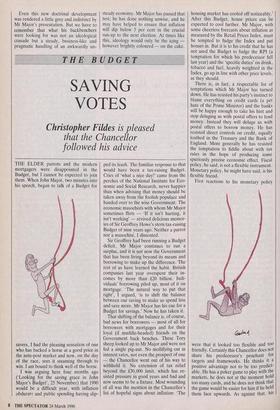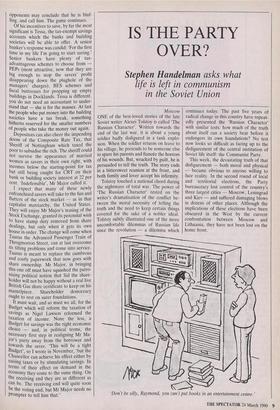THE BUDGET
SAVING VOTES
Christopher Fildes is pleased
that the Chancellor followed his advice
THE ELDER parrots and the modern mortgagers were disappointed in the Budget, but I cannot be expected to join them. When John Major, two minutes into his speech, began to talk of a Budget for savers, I had the pleasing sensation of one who has backed a horse at a good price in the ante-post market and now, on the day of the race, sees it steaming through to win. I am bound to think well of the horse.
I was arguing here four months ago (`Looking for the saving grace in John Major's Budget', 25 November) that 1990 would be a difficult year, with inflation obdurate and public spending having slip-
ped its leash. The familiar response to that would have been a tax-raising Budget. Cries of 'what a nice day!' came from the perches of the National Institute for Eco- nomic and Social Research, never happier than when advising that money should be taken away from the foolish populace and handed over to the wise Government. The economic masochists with whom Mr Major sometimes flirts — 'If it isn't hurting, it isn't working' — revived delicious memor- ies of Sir Geoffrey Howe's stern tax-raising Budget of nine years ago. Neither a parrot nor a masochist, I dissented.
Sir Geoffrey had been running a Budget deficit, Mr Major continues to run a surplus, and it is not now the Government that has been living beyond its means and borrowing to make up the difference. The rest of us have learned the habit. British companies last year overspent their in- comes by more than £20 billion. Indi- viduals' borrowing piled up, most of it on mortgage. 'The natural way to put that right', I argued, 'is to shift the balance between our saving to make us spend less and save more. Mr Major has his cue for a Budget for savings.' Now he has taken it.
That shifting of the balance is, of course, bad news for borrowers — most of all for borrowers with mortgages and for their loyal (if muddle-headed) friends on the Government back benches. These Tory sheep looked up to Mr Major and were not fed a single pig-nut. No mollifying cut in interest rates, not even the prospect of one — the Chancellor went out of his way to withhold it. No extension of tax relief beyond the £30,000 limit, which has re- sisted pressure in good years and bad and now seems to be a fixture. Most wounding of all was the mention in the Chancellor's list of hopeful signs about inflation: 'The housing market has cooled off noticeably.' After this Budget, house prices can be expected to cool further. Mr Major, with some cheerless forecasts about inflation as measured by the Retail Prices Index, must be tempted to fudge the Index and put houses in. But it is to his credit that he has not used the Budget to fudge the RPI (a temptation for which his predecessor fell last year) and the 'specific duties' on drink, tobacco and fuel, heavily weighted in the Index, go up in line with other price levels, as they should.
There is, in fact, a respectable list of temptations which Mr Major has turned down. He has resisted his party's instinct to blame everything on credit cards (a pet hate of the Prime Minister) and the banks will be happy enough to take his hint and stop deluging us with postal offers to lend money. Instead they will deluge us with postal offers to borrow money. He has resisted direct controls on credit, equally loathed in the Treasury and the Bank of England. More generally he has resisted the temptation to fiddle about with tax rates in the hope of producing some spuriously precise economic effect. Fiscal policy, he said, is not a flexible instrument. Monetary policy, he might have said, is his flexible friend.
First reactions to his monetary policy
were that it looked too flexible and too friendly. Certainly this Chancellor does not share his predecessor's penchant for targets and frameworks. He thinks it a positive advantage not to be too predict- able. He has a poker game to play with the markets, he does not at the moment hold too many cards, and he does not think that the game would be easier for him if he held them face upwards. As against that, his
opponents may conclude that he is bluf- fing, and call him. The game continues.
Of his incentives to save, by far the most significant is Tessa, the tax-exempt savings accounts which the banks and building societies will be able to offer. A senior banker's response was candid: 'For the first time in my life I'm going to start saving.' Senior bankers have plenty of tax- advantageous schemes to choose from — PEPs (most attractive, now that they are big enough to stop the savers' profit disappearing down the plughole of the managers' charges), BES schemes and fiscal buttresses for propping up empty buildings in Docklands. Tessa is different, you do not need an accountant to under- stand that — she is for the masses. At last the people who put money into the building societies have a tax break, something hitherto reserved for the smaller numbers of people who take the money out again.
Depositors can also cheer the impending doom of the Composite Rate Tax, that Sheriff of Nottingham which taxed the poor to subsidise the rich. The sheriff could not survive the appearance of married women as savers in their own right, with incomes below the starting-point for tax but still being caught for CRT on their bank or building society interest at 22 per cent. 'Indefensible', Mr Major called it. I expect that many of these newly enfranchised savers will take to the fun and flutters of the stock market — as in that capitalist matriarchy, the United States. They will enjoy Mr Major's teasing of the Stock Exchange, granted its perennial wish to have stamp duty removed from share dealings, but only when it gets its own house in order. The change will come when Taurus the Advanced Passenger Train of Throgmorton Street, can at last overcome its tilting problems and come into service. Taurus is meant to replace the cumbrous and costly paperwork that now goes with share ownership. Mr Major, in bringing this one off must have squashed the patro- nising political notion that Sid the share- holder will not be happy without a real live British Gas share certificate to keep on his mantelpiece. Shareholder democracy ought to rest on surer foundations.
It must wait, and so must we all, for the Budget which will reform the taxation of savings as Nigel Lawson reformed the taxation of income. None the less, a Budget for savings was the right economic choice — and, in political terms, the necessary first step in realigning Mr Ma- jor's party away from the borrower and towards the saver. 'This will be a tight Budget', so I wrote in November, tut the Chancellor can achieve his effect either by raising taxes or by stimulating savings. In terms of their effect on demand in the economy they come to the same thing. On the receiving end they are as different as can be. The receiving end will quite soon be the voting end, but Mr Major needs no prompter to tell him that.'



















































 Previous page
Previous page